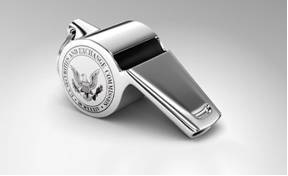SEC Again Postpones Hearing on Controversial Whistleblower Award Rule Amendments

For the second time, the SEC pulled the plug on hearings to consider amendments to some key rules affecting its whistleblower reward program. Just a day before hearings scheduled for September 2, 2020, the SEC canceled them, indicating only that they would be rescheduled for a future date. The Commission had done the same thing in fall 2019, abandoning hearings at the last minute.
There are many potential reasons for a cancelation like this, including that the SEC just recently swore in a new commissioner. But with both rounds, whistleblower advocates have wondered whether the SEC might be going back to the drawing board on the proposals.
Considering Award Amounts as a Factor
The proposed rules include several changes: some welcome, and some concerning. The proposal that has rightly garnered the most attention is a pair of rules that would allow the SEC to adjust awards up and down based on their magnitude, so long as they remain within the statutorily mandated range of 10-30%. On the upper level, the SEC would be permitted to adjust an award downward towards the 10% statutory minimum when it would exceed $30 million. At the lower end, the SEC could boost the award percentage – while again remaining within the statutory range – for small awards that would otherwise be below $2 million.
Although the boost to small awards was welcomed by whistleblower advocates, the downward adjustment to the largest awards met with strong resistance. Permitting the SEC to consider the resulting size of the award when determining what percentage to award a whistleblower could have deleterious effects on the program. Although it does not constitute a hard cap, it would certainly reduce the most dramatic awards.
This sends a worrying signal for whistleblowers who are trying to decide whether to take a risky step. Whether to blow the whistle is a huge question for someone sitting on potentially explosive information. Tragically, a whistleblower who decides to light that fuse often faces enormous risks to their own livelihood. The award programs must be enticing enough to offset that risk and incentivize individuals to do the right thing.
In that calculus, the big payouts have a lottery-winner effect. Most successful whistleblowers do not receive such huge awards, but the few blockbuster results have an outsize effect in encouraging participation. The SEC must be cautious to avoid undoing that positive.
Moreover, the imposition of what could amount to a 10% maximum award in cases with big SEC recoveries would wipe out all the other factors the SEC uses to set an award value. Those factors are designed to encourage behaviors the SEC wants in a whistleblower: promptness, candor, helpfulness. Why would the SEC want to eliminate those factors in the cases it should care the most about?
Streamlined Process
On the positive side, the SEC has proposed two new rules that would permit it to administer its program more efficiently. First, it would create a mechanism to bar filings by repeated frivolous tipsters or by those who have given false information to the Commission. Second, it would create a summary disposition process for the simplest award determinations.
These are unequivocally positive. The SEC program has been marked by careful consideration of award applications, but it has also been plagued by a backlog of submissions. Recent staffing increases and efficiencies have led to a burst of awards, but further improving the process will be to the benefit of all legitimate whistleblowers.
So What Does the Cancelation Mean?
All in all, the delay is a mixed-bag from the perspective of a whistleblower advocate. The rules to permit a streamlined process for facially deficient claims would be a critical tool to help the SEC spend time on the meritorious claims. But the proposal to reduce potentially large awards regardless of the contributions of the whistleblower would curtail the awards of those who were the sources of the most financially valuable tips. Delaying that rule, if the SEC takes the opportunity to reconsider it, will have been well worth stalling the other program improvements.
Read more:
- Financial & Investment Fraud
- Foreign Corrupt Practices Act (FCPA)
- Securities Fraud
- SEC Whistleblower Program
- Whistleblower Rewards
- Whistleblower FAQs
- I Think I Have A Whistleblower Case
Tagged in: FCPA, Financial and Investment Fraud, Importance of Whistleblowers, Securities Fraud, Whistleblower Rewards,